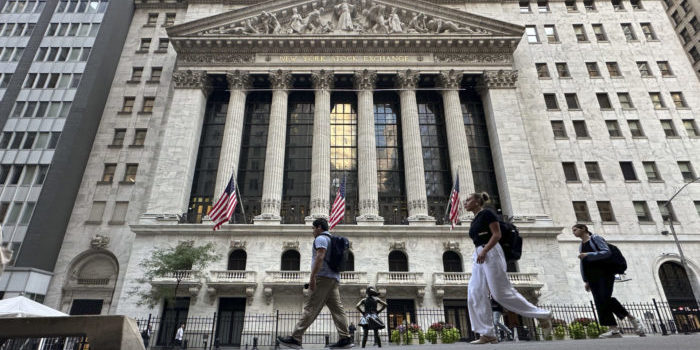(Headline USA) Attorney General Merrick Garland’s dubious declaration that the Justice Department was launching yet another Russia, Russia, Russia election-interference probe undoubtedly left conservatives suspecting more partisan shenanigans after the endless stream of lawfare attacks on GOP presidential nominee Donald Trump and his allies.
However, the DOJ also seemed hell-bent on undermining the current Biden–Harris administration by tanking the stock market and, with it, any hope of entering the final stretch toward the November election with a robust economy.
In its latest antitrust attack targeting Big Tech, the department set its sights on Nvidia, which has seen two years of incredible grown and innovation in the artificial intelligence community catapult it into a spot as one of the nation’s wealthiest companies.
Critics have said the DOJ’s aggressive trust-busting shakedowns, which oftentimes resolve with little more than a financial penalty, were stymying innovation. Google, Apple and Microsoft—all three of which are among Nvidia’s leading competitors in AI research—have all been targeted by prior antitrust lawsuits.
The announcement of the lawfare attack against Nvidia on Tuesday led to major market losses for the company—which broke a record for the biggest indivudual one-day stock tumble—and sent the rest of Wall Street cascading with it, amid mounting fears that the U.S. may be entering or already in a recession, paired with the pernicious inflationary economy that continues to keep prices sky high on basic goods such as groceries.
U.S. stock indexes were modestly lower in afternoon trading Wednesday as Wall Street added to its losses a day after the market’s worst skid in a month.
The S&P 500 was down 0.2% following a 2.1% drop a day earlier. The Dow Jones Industrial Average was down 79 points, or 0.2%, to 40,858. The Nasdaq was down 0.1% as of 2:03 p.m. Eastern.
Health care stocks and banks were among the biggest weights on the market. Molina Healthcare fell 7.6% and Centene slid 8.4%. American Express was 1% lower, while Citigroup fell 1.1%.
Technology sector stocks bounced back after declining in the early going and were holding up better than the rest of the market.
Nvidia, with its $2.65 trillion market value, rose 0.9% after earlier falling and dragging the major indexes lower, with speculators now hoping to buy the dip.
Other chipmakers also rose. Advanced Micro Devices climbed 3.6% and Broadcom added 1.4%.
Job openings in the U.S. fell unexpectedly in July, a sign that hiring could cool in the coming months.
The Labor Department reported that there were 7.7 million open jobs in July, down from 7.9 million in June and the fewest since January 2021.
Openings have fallen steadily this year, from nearly 8.8 million in January.
Last month, the department admitted that it had vastly overestimated its projected job-growth figures for the past year, suggesting that the Federal Reverve’s intended “soft landing” on interest-rate hikes may have hit harder than expected.
For the Biden-Harris administration, a rate cut might provide a much welcomed economic jolt. However, the appearance that the Labor or Justice Department has been meddling in the market to manipulate economic factors influencing the Fed’s decision could prompt backlash—particularly if casual stock-market investors feel the pinch on their portfolios.
The Fed is expected to start cutting its benchmark interest rate at its meeting later in September after raising rates to a two-decade high in an effort to cool inflation.
Despite strong indicators of a recession, left-wing economic “experts” continued to deny that the troubled economy was too hot or too cold, insisting that the current climate was just bad enough for the Fed to lend an assist to Vice President Kamala Harris’s campaign effort.
“Job vacancies declined, hires rose and quits were steady,” said Carl Weinberg and Rubeela Farooqi, economists at High Frequency Economics, in a note. “There is no signal here of any sudden collapse of the labor market here or any imminent recession.”
Several other reports this week will help give a clearer picture of the economy for the Fed and Wall Street.
The Institute for Supply Management will release its services sector index for August on Thursday. The services sector is the biggest component of the U.S. economy.
The U.S. will release its monthly jobs report for August on Friday. Economists polled by FactSet expect that report to show that the U.S. added 160,000 jobs, up from 114,000 in July and the unemployment rate edged lower to 4.2% from 4.3%. The report’s strength, or weakness, will likely influence the Fed’s plans for how it trims its benchmark interest rate.
Wall Street expects the central bank to begin trimming interest rates at its meeting later in September. Traders are forecasting that it will cut the benchmark rate by 1% by the end of 2024. Such a move would require it to cut the rate by more than the traditional quarter of a percentage point at one of its meetings in the next few months.
Dollar Tree slumped 23.4% after the discount retailer slashed its full-year earnings forecast. Hormel Foods fell 6.9% after the maker of Spam trimmed its revenue forecast for the year.
Department store operator Nordstrom was flat. Members of the Nordstrom family offered to take the company private for $3.76 billion per share cash, months after first expressing interest in a buyout.
In the bond market, the yield on the 10-year Treasury fell to 3.78% from 3.83% late Friday. That’s down from 4.70% in late April, a significant move for the bond market. The yield on the 2-year Treasury, which more closely tracks potential action from the Fed, fell to 3.78% from 3.87%.
The 10-year Treasury and 2-year Treasury are at their least inverted levels in more than two years. An inversion occurs when the shorter duration yield is higher than the longer duration yield. It has historically signaled a recession, though the current inversion has stood for more than two years amid a growing economy.
Markets in Europe and Asia fell.
Adapted from reporting by the Associated Press

